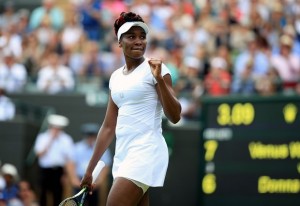By Randy Walker
@TennisPublisher
When I received an emailed media advisory a few weeks ago announcing that Venus Williams was hosting a conference call to announce her summer plans, my first thought was she might announce that she would retire after the 2016 U.S. Open.
Vickie Gunnarsson, the tournament director for the Bank of the West Tennis Championships, was also advertised as being on the call which also raised a suspicion. The Bank of the West tournament was the event where Williams made her celebrated pro debut in 1994, as you can read about here in the “Macci Magic” book excerpt here: http://www.worldtennismagazine.com/archives/10771
It would seem natural for Venus to retire after this year’s U.S. Open. She is 36 years old and hasn’t won a major title in eight years since Wimbledon in 2008. This August in Rio, she is going to be playing at her fifth Olympic Games, an event she is perhaps most associated with after winning four gold medals in singles and doubles. She couldn’t possibly still be playing pro tennis at age 40 during the Tokyo Olympics, could she? After the Rio Olympic Games, what does she have left to play for?
However, not having to play for a tangible title is not always a reason for an elite athlete to end a career.
I remembered one of the quotes that I have saved from Venus, to use for some social media promotion, where she simply said, “I like my job and think it is a wonderful thing being a tennis player.”
Venus has fun playing tennis. She enjoys the lifestyle of a professional tennis player. Why give this life up if you’re still a viable player? She is, after all, ranked No. 8 in the WTA singles rankings.
To not much surprise, this media conference call was not a retirement conference call and when Venus eventually hangs up her racquet is still unknown.
How a professional tennis player exits the game is strictly a personal decision. Each player handles it in different ways. Andre Agassi announced that he would retire at the U.S. Open at age 36 during a pre-event Wimbledon press conference in 2006. Andy Roddick left the game suddenly at the 2012 U.S. Open when he realized he was done with pro tennis after his first-round win over Rhyne Williams, saying on his 30th birthday, “I’ve thought all year that I would know when I got to this tournament and when I played the first round, I knew.”
After winning the 2002 U.S. Open at age 31, Pete Sampras withdrew from not only the U.S. Davis Cup team’s semifinal against France the following week, but he proceeded to withdraw from tournament after tournament following his win, into in the 2003 season, trying to find the motivation to continue. He finally realized that he was done when he withdrew from Wimbledon and he announced his retirement at the start of the 2003 U.S. Open, 50 weeks after hitting his last shot as a pro.
After winning her 22nd major title at the French Open in 1999, a 30-year-old Steffi Graf lost the final of Wimbledon to Lindsay Davenport. She played Amy Frazier in her opening match at the WTA event in San Diego weeks later, but could not finish the match due to injury and, days later in Germany, announced her retirement in a press conference.
Most poignantly for me was how Todd Martin ended his professional career at age 34. When he played his last tournament at the 2004 U.S. Open, he said his ranking, which dropped to No. 138 after his first-round loss to Fabrice Santoro, no longer dictated that he would be able to be directly entered into ATP tournaments. His ranking, he said, decreed his exit from the game.
People ask the same of 34-year-old Roger Federer and when will he retire. Like Williams, he also simply loves to play tennis, and loves the competition and the lifestyle. Let’s also not kid ourselves, he and Williams and others love the paychecks they receive too, and the perks that come along with being a top pro. Federer is, of course, still a contender for major singles titles, more so than Venus, so he still has a legitimate goal to win an 18th major singles title to extend his record haul in men’s tennis. How will 30-year-old Rafael Nadal eventually exit the game? Will injuries force him to no longer play? This is how 34-year-old Ivan Lendl concluded his career with a 1994 conference call announcing that his back injuries were too much for him to continue to play.
Chris Evert, whose final pro match was representing the U.S. in Fed Cup in 1989 at age 34, said on ESPN during Monday’s opening day of play at Wimbledon that viewers should appreciate Venus while she is playing now and that we don’t know how much longer she is going to play. However, she and Patrick McEnroe also discussed that since she is ranked in the top 10, she might still be playing for a while. Whenever she decides to conclude her Hall of Fame career, she will no doubt exit on her terms.

